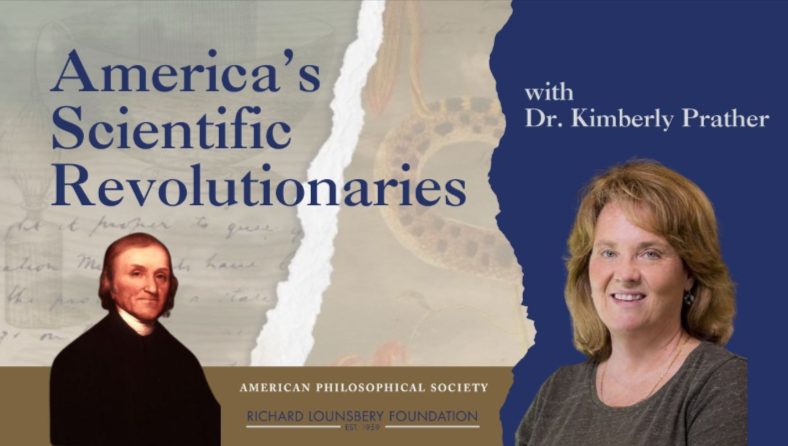

America’s Scientific Revolutionaries: A Conversation with Dr. Kimberly Prather
Hybrid Event | Scripps Research Institute, San Diego, CA
Join the American Philosophical Society and Scripps Research Institute for a special public lecture with atmospheric chemist Dr. Kimberly A. Prather (APS 2022), Distinguished Chair in Atmospheric Chemistry at UC San Diego. Dr. Prather will explore how early discoveries about “air” continue to shape our modern understanding of the connections between climate and human health.
This discussion reflects on the enduring legacy of Joseph Priestley—18th-century chemist, philosopher, and political thinker—whose groundbreaking experiments with gases like oxygen and carbon dioxide transformed science and influenced the course of the American Revolution.
The event is part of America’s Scientific Revolutionaries, a two-year initiative supported by the Richard Lounsbery Foundation, highlighting Revolutionary-era scientists and their influence on today’s world. (Note, the event is being held in California at 4pm Pacific Standard Time, which will be 7pm EST.)
Free with registration. Streaming details will be shared with registrants closer to the event date. Registration Link: https://www.amphilsoc.org/form/registration-for-kimprathertalk
Dr. Kimberly Prather is Distinguished Chair in Atmospheric Chemistry and a Distinguished Professor at the Scripps Institution of Oceanography and the Department of Chemistry and Biochemistry at UC San Diego. Her work focuses on how human emissions are influencing the atmosphere, climate, and human health. In 2020, she was elected as a member of the National Academy of Sciences and in 2019, she was elected as a member of the National Academy of Engineering. She is an elected Fellow of the American Geophysical Union, the American Association for the Advancement of Science, and the American Academy of Arts and Sciences. She is also a Member of the American Philosophical Society (APS 2022).
Full event details: https://www.amphilsoc.org/events/experimentation-air-and-human-health-considering-priestleys-scientific-legacies


